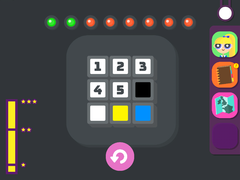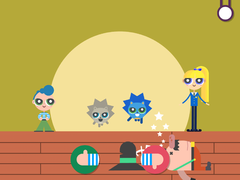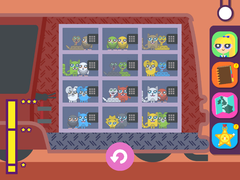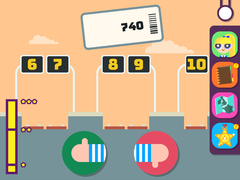En:LUCIOLE:Accueil
De GBLL, TAL, ALAO, etc.

|
Luciole is a game targetting English as a Foreign Language and more precisely oral comprehension for young learners. It was mostly conceived and implemented within the FLUENCE project (e-FRAN). |
The FLUENCE project
The LUCIOLE project is a subpart of the FLUENCE project.
General Information

|
|
Presentation
Objectives
FLUENCE aims to develop and validate digital applications for the classroom to adapt to the needs of each child and optimize their learning. Based on research data, its goal is to develop fluid and easy reading through specific training targeting underlying cognitive processes (visual/visuo-attentionnal processes) and holistic processes inherent to text reading (orthographical units, prosody, tone groups). As reading speed acts as a catalyst of text comprehension and orthographic learning, the general objective is to improve pupils' academic success significantly.
Stakes
One of the core hypotheses of the project is that action game modalities can enhance the targeted cognitive processes.
The focus on 6-8 year-olds is to prevent later learning difficulties caused by poor reading skills. The 2nd aspect of the project, targeting 6ème poor readers (10-11 yrs-old) aims at reducing performance gaps in middle school.
One of the issues is also to provide teachers with an interface allowing them to follow their pupils' progress in real time to provide them with individualized feedback.
In targeting reading fluency and its automation through the use of dedicated digital artefacts, the project follows the recommandation of the CNESCO 2016 consensus conference: « Lire, comprendre, apprendre : comment soutenir le développement des compétences en lecture ».
The part played by Luciole
Luciole's goal is to propose a purposeful task for the control group. It needs to involve:
- no reading;
- no action games modalities.
Luciole's objectives
Through the definition of the experimental design, the other applications of the FLUENCE project act as controls for the Luciole project. Thanks to the project's constraints, we can work on a diverse set of problems and envision long term research.
First, in learning a foreign language, oral comprehension was (in 2012) the competence most lacking for French learners[1]. The constraint of not resorting to reading is thus an opportunity in that regard.
The game modalities draw inspiration from usage based grammars, which, without denying the usefulness of output or other difficulties, state:
[…] Usage-Based Theory would predict that with sufficient input and practice, any morphosyntactic pattern can be acquired […] (Bybee, 2008:232)[2]
Beyond more strictly linguistic competences, one of the aims of Luciole is to prepare the child to evolve in a foreign environment in which they won't understand all utterances and will need to apply comprehension strategies.
Finally, the game aspect of Luciole, founded on narrative (among other mechanisms), will allow us to tackle the notion of playful attitude[3] [4] and its learning output.
Storyline
Synopsis

|
In Luciole, the player plays the part of Sasha, an 8-10 year-old French child who stumbles on a British trainee spy (Ash) who ends up recruting him. Through various missions, Sasha (helped by his mentor — Ash — and her friend-dot-spy-trainer — Hartguy) will arrest pet kidnapping bad guys. Their adventures will take them to England where they will have to mingle with (English speaking) bad guys to gather important information and free the animals. In the process, Sasha will develop his English listening skills.[5] |
Screeenshots
-
The main characters
-
Breaking the code #1
-
to go on saving animals or not to go on saving animals
-
Who to save?
-
Preparing for England
-
Don't miss your train
-
The London Eye
Contributors list

For official credits, please refer to the dedicated page.
Luciole is the brainchild of many people, some on short-term contracts, some in (paid or unpaid) internships, employed by the public or private sectors, and a statutory list as the one below is necessarily offensively reductive:
- UGA agents and researchers:
- Mathieu Loiseau ;
- Coralie Payre-Ficout ;
- Marie-Pierre Jouannaud ;
- Émilie Magnat ;
- Anne Blavot ;
- Adrea Soh.
- Development: Œil pour œil, kiüpe.
Funding and sub-projects
| 2017–2022 | 
|
Luciole is one of the application created in the FLUENCE project, funded by the French Government through the e-FRAN Call of the Programme d’investissement d’avenir, operated by the Caisse des Dépôts. |
|---|
| 2019 | Démarre SHS !, WP3 of Data@UGA funds an internship for the diffusion of sound resources created within Luciole. |
|---|
| 2021 | 
|
The ASLAN LabEx funds an internship for tracks analysis. |
|---|
| 2021–2024 | 
|
Within Pégase, Luciole mutualizes resources with two projects (ÉCRIMO2 2021–2024[6] et ObRéCo 2021–2023). |
|---|
| 2022 | 
|
The ASLAN LabEx funds an internship and some development to delve into the results obtained regarding phonological awareness. |
|---|
| 2022–2024 | 
|
In the context of FRANCE 2030, the ANR funds theTrans-3 project (ANR-22-FRAN-0008). |
|---|
Scientific communications
- EUROCALL 2017 ;
- SAES 2017 ;
- CALICO 2018 ;
- SAES 2018 ;
- Méthodologie recherche en acquisition 2018.
Notes and references
- ↑ European Commission (2012). First European Survey on Language Competences. Final Report, April 2012 (lien interne)
- ↑ Bybee, J. Usage-based grammar and second language acquisition
In Robinson, P. & Ellis, N. C. (Eds.) Handbook of Cognitive Linguistics and Second Language Acquisition, Routledge, 2008, 216-226 - ↑ Silva, H. Le jeu en classe de langue CLE International, 2008
- ↑ Brougère, G. Le jeu peut-il être sérieux? Revisiter Jouer/Apprendre en temps de serious game Australian Journal of French Studies, 2012, 49, 117–129
- ↑ Mémoire d'Adrea Soh
- ↑ Which financed improvement in the tracing system.






